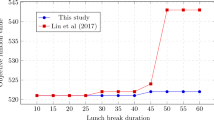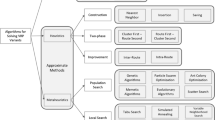Abstract
We deal with a schedule design problem for a heterogeneous fleet liner shipping service under uncertain waiting and handling times at ports. In a liner shipping service, longer than expected waiting and handling times at a port may cause a delay from scheduled departure time. We consider the problem to find the departure times at ports and sailing times of ships between ports so that the total fuel burn is minimized while targeted overall service level (a performance measure based on on-time departure probabilities) is achieved. We consider two new aspects of the problem. The first one is the heterogeneous fleet where each ship type may have different fuel efficiency, i.e. a different fuel burn function. The second one is considering critical ports on the route, i.e. considering the fact that on-time performance at some critical ports might be more important for the shipping company. We propose a model which finds different service levels for different ship type-port pairs by considering importance of ports and fuel efficiencies of ships. We also give a new overall service level measure for the entire route by combining service levels for different ship type-ports pairs. We propose a chance constrained nonlinear mixed integer programming formulation for the problem. Finally, we give computational results that show the effects of several experimental factors on fuel consumption, speed and service level.




Similar content being viewed by others

References
Alizadeh F, Goldfarb D (2003) Second-order cone programming. Math Program 95(1):3–51
Barrass CB (2004) Ship design and performance for masters and mates. Butterworth-Heinemann, Oxford
Bellsolà OX, Daamen W, Vellinga T, Hoogendoorn SP (2017) Network capacity estimation of vessel traffic: an approach for port planning. J Waterw Port Coast Ocean Eng 143(5):04017019
Ben-Tal A, Nemirovski A (2013) Lectures on modern convex optimization. Siam, Philadelphia
Christiansen M, Fagerholt K (2002) Robust ship scheduling with multiple time windows. Nav Res Logist (NRL) 49(6):611–625
Du Y, Chen Q, Quan X, Long L, Fung RYK (2011) Berth allocation considering fuel consumption and vessel emissions. Transp Res Part E Logist Transp Rev 47(6):1021–1037
European Commission. Marine Fuels & Ship Emission Controls. Appendix 5. European Commission (2000)
Fagerholt K, Laporte G, Norstad I (2010) Reducing fuel emissions by optimizing speed on shipping routes. J Oper Res Soc 61:523–529
Fai YK, Van TV (2015) Service quality and customer satisfaction in liner shipping. Int J Qual Serv Sci 7(2/3):170–183
Karlsson J, Eriksson BM (2012) Performance modelling; bunker consumption as function of vessel speed. Technical report, NYKCool
Kontovas CA (2014) The green ship routing and scheduling problem (GSRSP): a conceptual approach. Transp Res Part D Transp Environ 31:61–69
Kowalski A (2013) Cost optimization of marine fuels consumption as important factor of control ships sulfur and nitrogen oxides emissions. Zeszyty Naukowe / Akademia Morska w Szczecinie 108(36):94–99
Mulder J, Dekker R, Sharifyazdi M (2012) Designing robust liner shipping schedules: Optimizing recovery actions and buffer times. Report / Econometric Institute, Erasmus University Rotterdam. Erasmus School of Economics, pp 1–24. Retrieved from http://hdl.handle.net/1765/38636
Nemirovski A (2000) What can be expressed via conic quadratic and semidefinite programming?. Faculty of Industrial Engineering and Management, Technion- Israel Institute of Technology
Norstad I, Fagerholt K, Laporte G (2011) Tramp ship routing and scheduling with speed optimization. Transpo Res Part C Emerg Technol 19(5):853–865
Notteboom T, Vernimmen B (2008) The impact of fuel costs on liner service design in container shipping. In: Proceedings of the IAME 2008 conference
Psaraftis HN, Kontovas CA (2013) Speed models for energy-efficient maritime transportation: a taxonomy and survey. Transp Res Part C Emerg Technol 26:331–351
Qi X, Song D-P (2012) Minimizing fuel emissions by optimizing vessel schedules in liner shipping with uncertain port times. Transp Res Part E Logist Transp Rev 48(4):863–880
Ronen D (2011) The effect of oil price on containership speed and fleet size. J Oper Res Soc 62:211–216
Schrady DA, Smyth GK, Vassian RB (1996) Predicting ship fuel consumption: Update. Technical report, Naval Postgraduate School
Serasu Duran A, Gürel S, Selim Aktürk M (2015) Robust airline scheduling with controllable cruise times and chance constraints. IIE Trans 47(1):64–83
Wang S, Meng Q (2012a) Liner ship route schedule design with sea contingency time and port time uncertainty. Transp Res Part B Methodol 46(5):615–633
Wang S, Meng Q (2012b) Robust schedule design for liner shipping services. Transp Res Part E Logist Transp Rev 48(6):1093–1106
Wang S, Meng Q (2012c) Sailing speed optimization for container ships in a liner shipping network. Transp Res Part E Logist Transp Rev 48(3):701–714
World Shipping Council. http://www.worldshipping.org/about-the-industry/liner-ships, (visited: 2017-09-14)
Yang D, Zhang A, Jasmine SLL (2013) Impacts of Port Productivity and Service Level on Liner Shipping Operating Cost and Schedule Reliability. In: Proceedings of the International Forum on Shipping, Ports and Airports (IFSPA). International Centre for Maritime Studies, The Hong Kong Polytechnic University
Yao Z, Ng SH, Lee LH (2012) A study on bunker fuel management for the shipping liner services. Comput Oper Res 39(5):1160–1172
Author information
Authors and Affiliations
Corresponding author
Appendices
Appendix 1: Bunker consumption functions
Appendix 2: Distances between ports
Rights and permissions
About this article
Cite this article
Gürel, S., Shadmand, A. A heterogeneous fleet liner ship scheduling problem with port time uncertainty. Cent Eur J Oper Res 27, 1153–1175 (2019). https://doi.org/10.1007/s10100-018-0554-7
Published:
Issue Date:
DOI: https://doi.org/10.1007/s10100-018-0554-7



